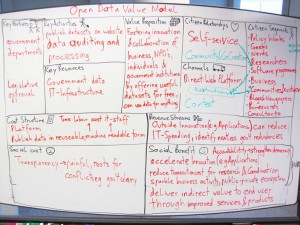
Jean Lievens: Participatory Data-Driven Democracy
Data, Governance
Participatory, Data-Driven Democracy
Blauer describes the impact data had on some of Maryland's toughest problems and why she wants data at the heart of government decision making.
The movie is part of a publicity series for Socrata GovStat. In theory:
Engaging Citizens & Getting Feedback
GovStat puts you on a fast track to Gov 2.0. Your goals and the metrics to measure them not only show up on public dashboards, the dashboards invite citizens to give feedback on what they see. Citizens become partners in innovation.
Plus, you can drop in text to explain your strategies, as well as include links to other resources and provide context. With GovStat, you can go beyond being transparent and actually encouraging citizen engagement.
Here their offering in one table: Socrata Plans.
Patrick Meier: A Research Framework for Next Generation Humanitarian Technology and Innovation
Architecture, Crowd-Sourcing, Data, Geospatial, P2P / Panarchy
A Research Framework for Next Generation Humanitarian Technology and Innovation
Humanitarian donors and organizations are increasingly championing innovation and the use of new technologies for humanitarian response. DfID, for example, is committed to using “innovative techniques and technologies more routinely in humanitarian response” (2011). In a more recent strategy paper, DfID confirmed that it would “continue to invest in new technologies” (2012). ALNAP’s important report on “The State of the Humanitarian System” documents the shift towards greater innovation, “with new funds and mechanisms designed to study and support innovation in humanitarian programming” (2012). A forthcoming land-mark study by OCHA makes the strongest case yet for the use and early adoption of new technologies for humanitarian response (2013).
These strategic policy documents are game-changers and pivotal to ushering in the next wave of humanitarian technology and innovation. That said, the reports are limited by the very fact that the authors are humanitarian professionals and thus not necessarily familiar with the field of advanced computing. The purpose of this post is therefore to set out a more detailed research framework for next generation humanitarian technology and innovation—one with a strong focus on information systems for crisis response and management.
Patrick Meier: Opening World Bank Data with QCRI’s GeoTagger
Data, Geospatial
Opening World Bank Data with QCRI’s GeoTagger
My colleagues and I at QCRI partnered with the World Bank several months ago to develop an automated GeoTagger platform to increase the transparency and accountability of international development projects by accelerating the process of opening key development and finance data. We are proud to launch the first version of the GeoTagger platform today. The project builds on the Bank’s Open Data Initiatives promoted by former President, Robert Zoellick, and continued under the current leadership of Dr. Jim Yong Kim.
The Bank has accumulated an extensive amount of socio-economic data as well as a massive amount of data on Bank-sponsored development projects worldwide. Much of this data, however, is not directly usable by the general public due to numerous data format, quality and access issues. The Bank therefore launched their “Mapping for Results” initiative to visualize the location of Bank-financed projects to better monitor development impact, improve aid effectiveness and coordination while enhancing transparency and social accountability. The geo-tagging of this data, however, has been especially time-consuming and tedious. Numerous interns were required to manually read through tens of thousands of dense World Bank project documentation, safeguard documents and results reports to identify and geocode exact project locations. But there are hundreds of thousands of such PDF documents. To make matters worse, these documents make seemingly “random” passing references to project locations, with no sign of any standardized reporting structure whatsoever.
Patrick Meier: Crisis Mapping, Neogeography, and the Delusion of Democratization
#OSE Open Source Everything, Data, Geospatial
Crisis Mapping, Neogeography and the Delusion of Democratization
Professor Muki Haklay kindly shared with me this superb new study in which he questions the alleged democratization effects of Neogeography. As my colleague Andrew Turner explained in 2006, “Neogeography means ‘new geography’ and consists of a set of techniques and tools that fall outside the realm of traditional GIS, Geographic Information Systems. […] Essentially, Neogeography is about people using and creating their own maps, on their own terms and by combining elements of an existing toolset. Neogeography is about sharing location information with friends & visitors, helping shape context, and conveying under-standing through knowledge of place.” To this end, as Muki writes, “it is routinely argued that the process of producing and using geographical information has been fundamentally democratized.” For example, as my colleague Nigel Snoad argued in 2011, “[…] Google, Microsoft and OpenStreetMap have really demo-cratized mapping.” Other CrisisMappers, including myself, have made similar arguments over the years.
Phi Beta Iota: This is hugely important. It comes down to “who controls the data in the aggregate,” yet another reason for an Autonomous Internet and Open Source Everything (OSE).
Bojan Radej: German Government Screws Up Open Data
Data
German government screws up open data
OpenGov Germany, 4 February 2013
Last year, the German government commissioned a fairly extensive study (Link) on open data, and started preparations for an open government data portal. The open data community felt somewhat relieved. After all, lobbying for more open government in Germany, the cradle of prussian bureaucracy, is not exactly an easy task. This is a state apparatus dominated by information silos, dusty hierarchies, pen and paper workflows and an attitude towards citizens that often borders on arrogant. Bravo to the few change agents within the Federal Ministry on the Interior, who over the last months and years have closely collaboratored with a multitude of actors, including app contests and bar camps.
Here is what happened. Actors like the Open Knowledge Foundation (German chapter) had long ago built an open data visualization website (link), and had offered both the Interior as well as the Ministry of Finance, to actually provide that platform to them, basically developing infrastructure for the government. How nice. Community-public-partnership, real open government. What a pipe dream. Last fall, the Ministry of Finance unveiled its own data visualization website, for who knows how many thousand euros in fees paid to web agencies (Update: it cost 40.000 EUR, the original budget was 200.000 EUR ). It looks alright but isn’t as open as experts had hoped, and the amount of data is lackluster – tools for comparison and other accountability-encouraging functionality is missing.
Yoda: European Union Open Data Portal Opens
Data
A start, good this is.
EU Commission unwraps public beta of open data portal with 5800+ datasets, ahead of Jan 2013 launch
Good news for open data lovers in the European Union and beyond: the European Commission on Christmas Eve quietly pushed live the public beta version of its all-new open data portal.
For the record: open data is general information that can be freely used, re-used and redistributed by anyone. In this case, it concerns all the information that public bodies in the European Union produce, collect or pay for (it’s similar to the United States government’s Data.gov).
This could include geographical data, statistics, meteorological data, data from publicly funded research projects, and digitised books from libraries.
. . . . . . . .
From the newly launched website:
This portal is about transparency, open government and innovation. The European Commission Data Portal provides access to open public data from the European Commission. It also provides access to data of other Union institutions, bodies, offices and agencies at their request.
The published data can be downloaded by everyone interested to facilitate reuse, linking and the creation of innovative services. Moreover, this Data Portal promotes and builds literacy around Europe’s data.

